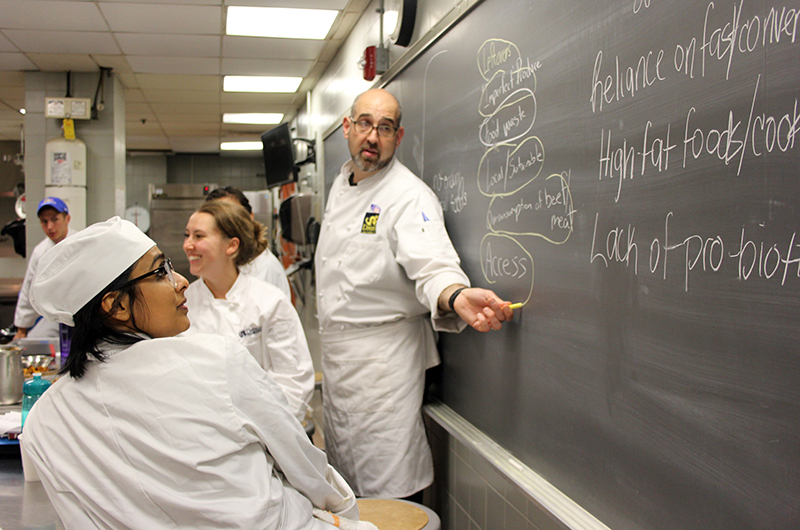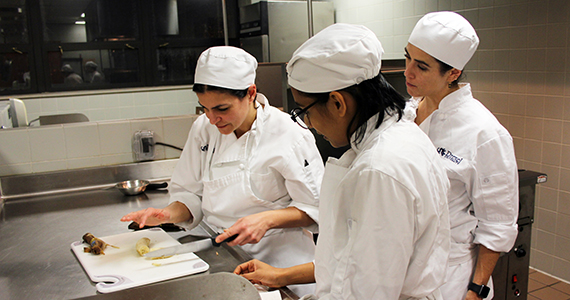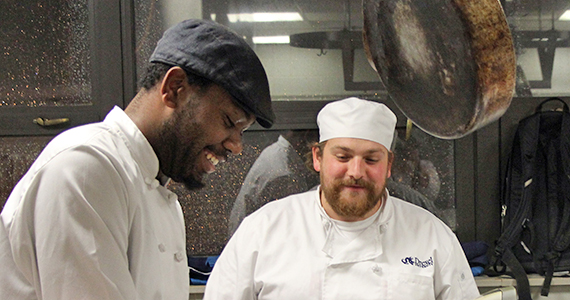New MS Program Focused on Changing the World (of Food)

Professor Jonathan Deutsch leads MS in Culinary Arts and Science students, include Sheetal Bahirat in a discussion on food waste in a class on culture and gastronomy.
November 15, 2017
A CEO, a nutritionist and a brewer walk into a classroom….and talk about food waste.
This is not a joke; it’s the very center of Drexel’s new master’s degree program in Culinary Arts and Sciences. The program combines a focus in culinary arts, food science and food systems to prepare students for roles in a variety of professional roles working with food. Technical coursework looks at food composition and microbiology while the social sciences side looks at tourism, culture and politics surrounding food.
For members of the program’s inaugural class, its major strengths are the multifaceted approach to food and the diversity of perspectives its students are bringing to the table.

Sheetal Bahirat (front) collaborates with classmates in her Culture and Gastronomy course
Sheetal Bahirat came to Drexel from Bangalore, India, where she was using her business education to run her own cold pressed juice and smoothie business. The company focuses on providing healthy beverage options to naturally supplement and accompany breakfast without any added sugar.
Bahirat chose the MS in Culinary Arts and Sciences program as a way to expand her knowledge in product development and food science. She needed the food knowledge to bring her ideas to life for her business. She originally looked at various culinary programs around the world, but none seemed to fit what she was looking for.
"I always felt like something was missing,” she said. “Culinary programs did not offer enough food science, and food science programs rarely focus on building culinary skills.”
Because of this, the Drexel program is quite unique in providing both sets of skills while staying connected to Drexel’s commitment to hands-on learning and real-world application.
"This program gives you access to both worlds and helps plug the gaps in your knowledge,” Bahirat said. “We have a real-world approach, and as students we get the opportunity to work on real problems at real companies. With access to the Drexel Food Lab and being able to help out in the student run restaurant - we get our hands dirty as we learn.”
Paul Mims, who was born and raised in Cleveland, Ohio, joined the MS in Culinary Arts and Science program after completing his degree in dietetics and clinical nutrition at Bowling Green State University. He found the field of clinical nutrition lacked the multi-faceted approach he was looking for.
"I found myself conflicted with looking at food as a biological necessity rather than a cultural paradigm,” he said.
Deciding he did not want to take the route of many of his classmates – becoming a registered dietician – he discovered the Drexel program.
“It was a program that I have always dreamed of,” he said. “But I was never aware of anything of its nature existing at the graduate level.”

Paul Mims (left) and Greg Yingling (right) work together on a class assignment utilizing food waste
Greg Yingling, who hails from Moorestown, New Jersey echoed this sentiment. He also chose the culinary arts and science master’s program because of its unique combination of culinary and food science.
After spending summers working at delis at the Jersey shore growing up and completing his bachelor’s degree in management at Clemson University, he joined the opening team at South Jersey’s Double Nickel Brewing Company. He worked as a brewer and cellar man for two years before deciding to go back to school at Drexel.
Both Yingling and Bahirat feel a major strength of the program are their fellow students.
“My favorite part is just the people,” she said. “They are equally in love with this industry, and all bring something to the table. A normal conversation over coffee can be an enlightening experience.”
“I have been most impressed with my peers in the program,” said Yingling. “It is a dynamic group of impressive people with some pretty cool backgrounds.”
Bahirat is excited about the opportunities for her once she completes the program, and the edge she is gaining by learning both the culinary and food science aspects of the industry. She feels she will be well prepared to tackle the challenge of making food that is sustainable, nutritious and delicious.
“In the years to come sustainable, nutritious foods and making them accessible to every woman, man and child is going to be a great struggle. From educational techniques on how to reduce food waste at home to how to ensure that good food doesn't get squandered will require the hands and hearts of many culinary and food science experts like those in this program.”
“A unique program like this is necessary for such a unique system as food,” adds Yingling.
Mims plans to use this program to assist his background in nutrition to work in food advocacy and communications.
All three are looking at the social impact of food as a part of their culture and gastronomy course. In this class, they examine the why behind food choices through the lens of personal identity, responsibility and convenience of the food system. They have been challenged and inspired by the discussion of important topics such as food access and reducing food waste.
Additionally, because of Drexel’s connection to the local Philadelphia food and beverage industry, students have been exposed to a wide range of professionals in the food and nonprofit industry that will help them achieve their goals professionally and as responsible citizens of the world.
“This program has already opened doors for me that I would have never imagined,” said Mims.